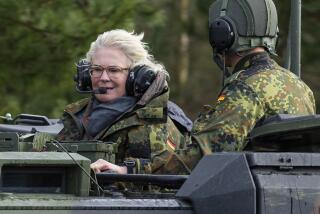Anti-War Activist, Iraq Supporter Resigns as France’s Defense Chief : Alliance: Chevenement becomes the first major political casualty of the Gulf War.
- Share via
PARIS — France’s anti-war minister of defense resigned Tuesday, the first major political casualty of the Persian Gulf conflict within the international coalition opposing Iraq.
The resignation of Defense Minister Jean-Pierre Chevenement will remove certain ambiguities in France’s military participation in the war. Chevenement, a founding member of the Franco-Iraqi Friendship Assn. and a proponent of a long-term French policy of close relations with Arab states, has been strongly opposed to a military solution to the conflict.
France, with 12,000 troops, 12 ships and 52 fighter-bomber aircraft, is the third most important Western military force in the gulf, behind the United States and Britain. French Jaguar aircraft flew two missions on Tuesday, attacking positions of the Iraqi army’s Republican Guard inside Iraq territory and bringing to more than 200 the total number of French missions in the war.
More important from an allied perspective, the presence of a significant French force in the Gulf War has prevented the Saddam Hussein regime from describing Western members of the coalition as an Anglo-American force.
Chevenement’s resignation was featured prominently in Iraqi news agency reports soon after it was announced, and it was portrayed as a division in the allied ranks.
Since Iraq’s invasion of Kuwait in August, Chevenement opposed practically every step advanced by President Bush and other Western leaders, including the naval and air blockades, the deployment of Western troops in Saudi Arabia, the Jan. 15 deadline for the withdrawal of Iraqi troops from Kuwait, the use of military force and, most recently, military attacks on Iraqi soil. In each case, he was overruled by President Francois Mitterrand.
Lately, the handsome, hot-tempered Chevenement, 51, the son of schoolteachers in eastern France, came under increasing fire from political opponents and even members of his own governing Socialist Party who accused him of undermining French participation in the allied effort.
His resignation was accepted without comment Tuesday morning by Mitterrand at the Elysee Palace. He was replaced by Interior Minister Pierre Joxe, 56, a longtime Mitterrand ally who is known for his intelligence and quiet statesmanship. A former army officer in Algeria, the new defense minister is the son of Louis Joxe, a minister in the government of the late President Charles de Gaulle.
“The French policy in the gulf is now a clear signal,” said an obviously relieved aide to Mitterrand. “Now that Chevenement has resigned, the static is gone.” The aide noted that as interior minister, Joxe has attended all the key military strategy sessions at Elysee, including one that Chevenement, in one of his frequent piques about the war, boycotted.
Chevenement couldn’t resist a few parting salvos in his terse letter of resignation. “The nature of the war,” he said in one of them, “threatens each day to push us farther away from the objectives set by the United Nations.”
It was not the first time Chevenement had resigned from the Socialist government. In 1983 he quit the post of minister of research and technology in a dispute about funding. “A minister shuts his mouth or, if he wants to open it, he resigns,” Chevenement explained.
During the gulf conflict, however, Chevenement seemed content to remain in his job and openly criticize his government’s policies from within. Although he joined the majority of the French Parliament in voting to send French military units into combat, several of his close colleagues in the party broke ranks and voted against the measure when it was put to a vote Jan. 16.
What may have finally chased Chevenement from the job was his anger at being ignored by Mitterrand on important defense decisions. The French president instead turned to his chief military adviser, Vice Adm. Jacques Lanxade. When Mitterrand needed to brief American officials on military matters, it was Lanxade who did the briefings.
In perhaps the most telling blow, the government last week chose Lanxade to appear on an important Sunday night news interview show to discuss French defense policy. Normally, the defense minister would be the one to appear on such a high-profile program.
Why the rebel defense minister lasted so long in the key position supervising France’s military forces in the gulf is partly a factor of French politics and party loyalty. Chevenement is leader of a minority faction of the governing Socialist Party.
Because Chevenement does have a small, but strong, political following on the left, Socialist Party leaders are worried that he might do more damage outside the government than inside, where they at least have had some control on his behavior. As it is, the minority government of Socialist Prime Minister Michel Rocard has barely survived several of the 10 censure votes it has faced in the last two years.
Opposition leaders from the right, most of whom support French participation in the war, applauded the Chevenement decision.
Commented Alain Juppe, secretary general of the moderate-right Rally for the Republic party:
“It seemed to me very difficult to have a minister of defense who went into the whole operation always retreating.”
More to Read
Sign up for Essential California
The most important California stories and recommendations in your inbox every morning.
You may occasionally receive promotional content from the Los Angeles Times.













